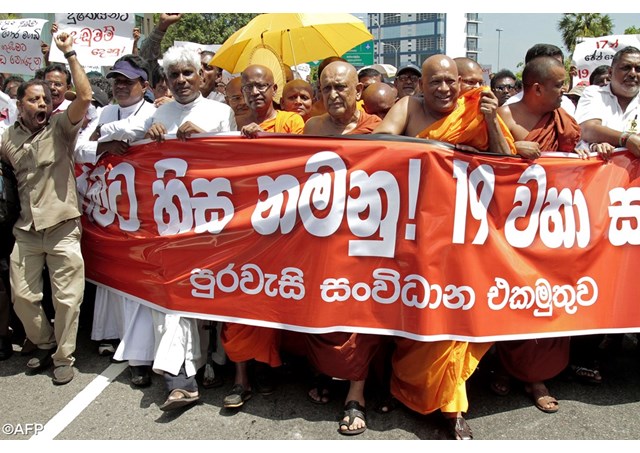
Lankan Parliament Passes Landmark 19th Constitutional Amendment Bill

The Sri Lankan parliament on Tuesday passed the landmark 19th Constitutional Amendment Bill (19A) to prune the draconian powers of the Executive Presidency and set up Independent Commissions to de-politicize major arms of the State such as the judiciary, bureaucracy, police and the Elections Commission.
The bill was passed with the required two-third majority. 215 of the 225 members of parliament voted for it. Only one voted against, one abstained, and seven were absent. The bill has now gone to a parliamentary committee where further amendments could be moved. But a simple majority would do to get these amendments passed.
Significantly, many of those who were in the forefront of the campaign against the 19A, and who were acolytes of former President Mahinda Rajapaksa, voted for it after President Maithripala Sirisena and Prime Minister Ranil Wickremesinghe accommodated the amendments moved by the opposition Sri Lanka Freedom Party (SLFP) and the United Peoples’ Freedom Alliance (UPFA).
The 19A envisages a partial reintroduction of parliamentary democracy which existed in Lanka till 1978 when the Presidential system was established. Under 19A, the directly elected Executive President “shall” act on the advice of the Prime Minister and his cabinet, though the President will continue to be the Head of the Executive and the Cabinet with the right to hold cabinet portfolios. The President’s term has been cut from six to five years, and no incumbent can bid for more than two consecutive terms.
The 19A establishes a Constitutional Council, which in turn, will set up Independent Commissions to oversee appointments and the work of eleven organs or functions of the State. Initially, the Constitutional Council was to comprise the Prime Minister, Leader of Opposition, Parliament Speaker and seven non-political distinguished persons who would represent various interests and social groups. But the SLFP and UPFA wanted the majority of the members to be MPs. Finally, a compromise was struck by which, in the ten members council, seven will be MPs and three will be non-MPs.
The 19A was a major election promise of President Sirisena who was keen on dismantling the near dictatorial system presided over by his predecessor, Rajapaksa. But Sirisena’s bid to usher in democracy ran into rough weather because the 19A became a battlefield for two bitter rivals, namely, Sirisena and the ruling United National Party (UNP) on the one hand, and the opposition SLFP and UPFA led Rajapaksa, on the other.
Civic rights groups had organized mass demonstrations Monday in Colombo urging Parliament to on Tuesday pass the Amendment to the constitution, which would curtail the president’s executive powers and enact better checks on the executive. Hundreds of religious leaders, university lecturers, artists, lawyers, trade unions and politicians marched on Colombo while singing slogans and holding posters of support.
Outspoken Buddhist monk Venerable Mduluwawe Sobitha Thero had urged lawmakers to remove powers of the executive presidency and establish the independent commissions pledged on the election campaign. “People elected a new president, defeating a corrupt regime in January to demolish the executive presidency system,” said the monk, addressing demonstrators on a vehicle near parliament.
“We appeal to the 225 lawmakers in the Parliament to vote for the 19th constitutional amendment tomorrow to establish good governance in the country. If not you will be rejected by people. Hundreds of people marched because they all suffered during the last 37 years under the executive presidential powers,” the Buddhist monk had said.
The demonstrators urged the establishment of a range of independent institutions including a Constitutional Council, Bribery Commission, Election Commission, Public Service commission, and National Police Commission.
“Because of the amendment, the president is more accountable to the Parliament and the judiciary,” said JC Weliamuna, a human rights lawyer and the former executive director of the Sri Lankan branch of the anti-corruption organization Transparency International.
President Sirisena had told Parliament on Monday he doesn’t want executive powers, and urged passage of the 19th amendment, saying the executive presidency has rarely been used for the good of the country.
The Catholic Bishops’ Conference too had urged the immediate curtailment of dictatorial features in the constitution by enacting the 19th amendment to the constitution.
The 19A was touted as a democratic revolution by Sirisena, but it was criticized for destroying the strong state created by Rajapaksa. Sirisena’s political future was at stake because if he did not win the battle of 19A, Rajapaksa would have staged a quick comeback in the next parliamentary elections expected anytime between June and September.
(Source: the New Indian Express and UCANews)
| All the contents on this site are copyrighted ©. |


